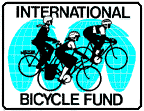India: Bicycle Promotion
Among Rural Women

![]() IBF is 100%
IBF is 100%
solar powered
![]()
Mobility & Quality of Life
From Literacy To Empowerment To Bicycles In Rural India
For years, fetching water for Mariamman of Siranjeni village was one of many dreary chores. When the village well dried up in summer, she had to trudge 2 km to a neighboring village to secure water. Now fetching water is far easier; all she has to do is take her bicycle. Like Mariamman, thousand of women in Pudukottai district in Tamil Nadu are using their bicycles, not just to fetch water but for a myriad utility trips. But it hasn't always been this way.
It was novel literacy drive, launched in 1991, that has lead to 50,000 women in the 3,000 villages of Pudukottai (370km from Madras, India) to learn to ride bicycles. Originally, the scheme had four elements; literacy, arithmetic, awareness and application. Seeing an additional need, collector Sheela Rani Chungat added a fifth element -- mobility. These days Pudukottai women sing "we have learnt to cycle, brother/ and with it, we have turned the wheel of our lives, brother". As the song bears out, the results of Chungat's initiative have far exceeded expectations.
In the harvest season, women now carry bundles of ripe stalk on a cycle, not on their heads. When the men work in the fields, their lunches are delivered to them by their wives on wheels. And sometimes, newly mobile mothers save their children long, tiring walks to and from the village.
The cycle-training program started as a no-cost affair. Villagers lent one or two cycles. Initially classes were held after dark, helping the students to get over their initial shyness and reluctance. "There were few people around to make fun of us when we fell down," recalls Mariamman.
When some women began showing off their success on their husbands' and brothers' cycles, the bug caught on. Next, the program coordinators arranged for bank loans to buy bikes. Still, some women have been unable to derive the fullest mileage from their recently acquired skills. Most do not have the money to buy their own cycles and their fathers, brothers and husbands, get first preference on family bikes. There are also family-imposed restrictions -- chores, sewing classes and primary health care are all right, but movies, cruising and fun outings are an absolute no-no.
[Base on an article by Nirupama Subramanian, in "India Today".]
For details on this and other programs promoting bicycle transport write: Laxmi Narain Modi, Exec. Director., Nation Building Forum, 305 Bakshi House, 40-41 Nehru Place, New Dehli 110019, INDIA.
Home | About Us | Contact Us | Contributions | Economics | Education | Encouragement | Engineering | Environment | Bibliography | Essay Contest | Ibike Tours | Library | Links | Site Map | Search
![]()
The International Bicycle Fund is an independent, non-profit organization. Its primary purpose is to promote bicycle transportation. Most IBF projects and activities fall into one of four categories: planning and engineering, safety education, economic development assistance and promoting international understanding. IBF's objective is to create a sustainable, people-friendly environment by creating opportunities of the highest practicable quality for bicycle transportation. IBF is funded by private donation. Contributions are always welcome and are U.S. tax-deductible to the extent allowed by law.
![]()
![]() Please write if you have questions, comment, criticism, praise or
additional information for us, to report bad links, or if you would like to be
added to IBF's mailing list. (Also let us know how you found this site.)
Please write if you have questions, comment, criticism, praise or
additional information for us, to report bad links, or if you would like to be
added to IBF's mailing list. (Also let us know how you found this site.)
